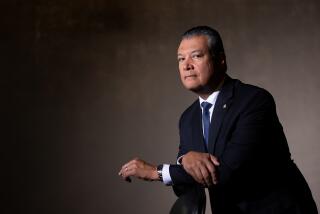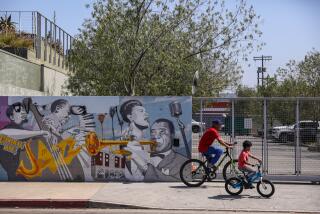Breaking into the ‘90s. A New World in Time. Walls fall, debts rise, politicians thrive, environments suffer-a look over the shoulder and over the horizon. : 1989: Four political fixtures suffer hards times and bad calls : Running Into Trouble
Tom Bradley, 72, was the loneliest and strongest of long-distance runners, the student from South-Central Los Angeles who refused to take shop classes, the UCLA track star who became a policeman, lawyer, city councilman and, in 1973, mayor of Los Angeles.
Tall, dignified--even inscrutable--the first black mayor of a huge white-majority city, Bradley won four terms and ran without a tumble. Perhaps his finest moments came with the 1984 Olympics, when Bradley pushed the games and watched the city turn a profit.
Then came 1989, with a deluge of charges that the mayor offered preferential treatment in return for campaign contributions, that he accepted payments from a bank while depositing public funds in it, that carnivals were staged illegally to raise campaign funds. The city attorney found “insufficient evidence” to prosecute. But the public lost faith. The unmaking of a self-made man. City Councilman Zev Yaroslavsky was running hard for mayor until early 1989, with big money and a powerful amalgam of liberal groups ready to unseat Tom Bradley.
But his own campaign advisers--company acronym BAD--helped do him in. BAD memos on campaign strategy--with a hint of elitism, a possible whiff of racism--became public. Yaroslavsky disowned them but the damage was done.
Polls showed voters swinging back to Bradley. Environmentalists who once embraced Yaroslavsky looked around to count new projects high-rising on the home turf; they began wondering if he was really a developer in disguise.
For 15 years, Yaroslavsky raced smartly, from UCLA activism to City Hall, from blue jeans to white collars. Then he stumbled, figured the odds were long and went back to the council. The promising young man who said he wanted to save the world decided not to go the distance.
Alan Cranston, elected to the U.S. Senate for four consecutive terms, stays in superb physical shape. At 75, he does morning wind sprints and dines on low-fat fish. A senator for forever.
Liberal crusader and master fund-raiser, Cranston is suddenly in rotten political shape. He took $47,000 in campaign money and $850,000 more for voter-registration groups from Charles H. Keating Jr., the S&L; mogul who gave millions to both parties until the government seized his insolvent firm. Now, Internal Revenue agents investigate the $7 million Cranston raised for voter registration. The Keating-related charge: giving special treatment to a donor. The IRS-sponsored probe: possible violation of tax-exempt status to play partisan politics.
The senator denies doing wrong and plans to run again. But 71% of his fellow Democrats in California say he should not compete in ‘90; 38% think he should step down right now.
Peter F. Schabarum’s peers at the Los Angeles County Board of Supervisors know him as Pete. In 1989 his enemies were calling him Pedro, when Schabarum celebrated his Mexican grandmother.
The one-time triple-threat fullback for UC Berkeley represents more than 1.6 million citizens, but now he bucks a whole wall of agencies that claim 1981 district lines were designed to dilute Latino voter strength--hence, Latino representation. The U.S. Justice Department filed suit. Two local activist groups joined as plaintiffs. Even a Republican colleague on the board seemed to help hobble Schabarum’s 1990 reelection chances.
The issue comes to trial this week. While Schabarum says he honors his Mexican heritage, some Latinos say he has been their worst enemy.
Schabarum style is neither sweet nor salsa--more maverick, blunt. His next race may depend less on form than on where the playing field is drawn.
More to Read
Sign up for Essential California
The most important California stories and recommendations in your inbox every morning.
You may occasionally receive promotional content from the Los Angeles Times.










